German Shepherd Dogs are amazing family pets and are fairly easy to train overall. But they do have some characteristics and natural instincts that are hard-wired into their brains. If you are trying to train your GSD, you need to know a bit about the breed and what makes them tick. There are also a few important things to keep in mind when training your GSD. Keep reading to learn more!
German Shepherd Dog Training Tips
While there are many different approaches to training dogs, it’s important to use positive reinforcement methods that focus on building a strong relationship between you and your dog. Here are some tips for successful German Shepherd dog training:
Understand the Characteristics of a German Shepherd
One of the defining characteristics of German Shepherds is their intelligence. They are quick learners and enjoy being challenged, which makes them well-suited for training and learning new skills. German Shepherds are also known for their loyalty and protective nature towards their owners and family members. They can be wary of strangers and are often used as guard dogs for this reason.
Additionally, GSDs are active dogs that require plenty of exercise and mental stimulation to prevent boredom and destructive behavior. They excel at activities like agility, tracking, and obedience training, and make great companions for active individuals or families.

Start with basic training & socialization
Both basic training and socialization are equally important. Basic training, like teaching your dog to sit, stay, come, and walk on a leash, is essential for all dogs. They don’t come “programmed” to know what we expect from them, after all. Thankfully, German Shepherds are particularly smart and enjoy learning, so they often excel at obedience training.
Along with the basics, you’ll also want to work on your pup’s socialization skills as early as possible. Socialization introduces your dog to new people, animals, and environments. This is important for all dogs, but particularly for German Shepherds, who can be reserved or even protective of their owners.
Fortunately, you can often combine socialization with basic training by enrolling in a puppy class. Look for a class that teaches the 7 essential commands that all dogs should know. These include:
Sit
Stay
Come
Heel
Down
Leave it
Off
These commands don’t just help you raise a well-behaved pooch, they also lay the groundwork for more advanced skills and tricks. If you can’t enroll in a puppy training class, I recommend checking out Zak George’s dog training video series, starting with the one below:
Use positive reinforcement
Positive reinforcement is exactly what it sounds like, a training method that uses rewards to reinforce your dog’s good behavior. It’s an effective way to train your German Shepherd because it helps build trust and strengthens your bond. Some ideas for positive training methods include:
Treats: One of the most common forms of positive reinforcement is using treats as rewards for good behavior. Use small, bite-sized training treats that your dog loves and give them immediately after they perform the desired behavior.
Praise: Dogs love to please their owners and thrive on praise and attention. Use positive, happy tones when praising your dog for their good behavior, such as saying “good boy!” or “great job!”
Playtime: Many dogs love to play, so incorporating playtime into your training sessions can be a great form of positive reinforcement. Use a favorite toy as a reward for performing the desired behavior.
Clicker training: Clicker training is a form of positive reinforcement that uses a clicking sound to signal to your dog that they have done something right. Pair the click with a treat or other reward to reinforce the behavior.
“Life rewards:” In addition to treats and playtime, there are many other “life rewards” that can be used as positive reinforcement. These may include going for a walk, getting to meet other dogs, or being allowed to play in the park.
Whatever reward you choose, remember that positive reinforcement should be used consistently and immediately after the desired behavior is performed. This will help your dog associate the behavior with the reward and increase the likelihood of them repeating the behavior in the future.
Avoid punishment-based training
Punishing your dog for bad behavior, on the other hand, is not an effective training method. It can create fear and anxiety and may damage the relationship between you and your dog. Please don’t ever hit your dog. That’s not training, it’s abuse, plain and simple.
While we’re talking about punishment-based training, I also recommend ditching the whole “be the alpha” thing. That entire training philosophy was built on a misunderstood study of wolves. There’s been so much research proving that dogs are NOT pack animals, at least not in the way we thought they were for years.
Keep your training sessions consistent yet short
One of the most important things you can do when you begin training any dog breed, is to be consistent. For a German Shepherd Dog, though, this is especially important. Consistency provides guidelines and expectations — things that a German Shepherd will respond to.
However, it’s important to avoid overwhelming your pooch with long sessions. Dogs have short attention spans, so it’s important to keep training sessions brief and focused. Ten to fifteen minutes per session is usually sufficient.
Provide physical AND mental stimulation
German Shepherds are active dogs that need plenty of exercise, yes. But they also need A LOT of mental stimulation to prevent boredom. Here are a few great “brain games” to try with your GSD:
Puzzle toys: Puzzle toys are a great way to mentally challenge your dog and provide them with a fun and stimulating activity. These toys often involve hiding treats or kibble inside and encouraging your dog to figure out how to get to them.
Agility Training: Agility dog training involves teaching a dog to navigate through a variety of obstacles such as tunnels, jumps, and weave poles in a timed and structured environment. It’s a fantastic way to combine both physical and mental exercise.
Change of scenery: A change of scenery can also help mentally engage your German Shepherd. Take them for a walk in a new location or visit a dog park to provide them with new sights, smells, and experiences.
Interactive play: Playtime is important for dogs, and interactive play can help engage their minds as well. Playing games like fetch, hide-and-seek, or tug-of-war can help keep your German Shepherd mentally stimulated.
Nose work: German Shepherds have a great sense of smell, and nose work activities can be a great way to engage their minds. Hide treats or toys around your home or yard and encourage your dog to find them using their nose. Check out the video below for tips on starting nose work with a German Shepherd.
Seek professional help if needed
If you feel as though you are not experienced enough or able to provide the training your German Shepherd needs, search for a local trainer who can take on the task. The trainer will work with your dog and then help you learn how to apply the principles they have taught your German Shepherd.
A trained and well-behaved German Shepherd can be one of the best dogs for your family. German Shepherds are intelligent, loving, and loyal. Their protective instincts make them a good choice if you want a pet as well as a guard dog. Proper training is an important part of ownership and is a must for you and your dog.
Do you have any other German Shepherd dog training tips? Share below!


